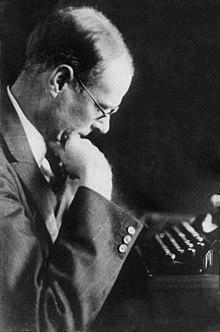March 2025

Why isn’t everyone talking about this book? Why hasn’t it been made into a film?
Sinclair Lewis’s novel takes aspects of Hitler’s rise and applies them to an American scenario.
An unprincipled man becomes a popular leader and achieves power through various cunning means: adept use of the ballot box, a gross manipulation of free speech, a distortion of language and an admixture of very bad ideas with a few good ones.
The novel was published in 1935 and reflects its context. Many of the names mentioned in the novel belong to real people of the time, including Upton Sinclair (incidentally, a cousin of Wallis Simpson but no relation to Sinclair Lewis).
Note the use of ‘Minute Men.’ Although this moniker is taken from the colonial militia companies who were trained in weaponry and tactics (and could be ready at a minute’s notice) Lewis is obviously using the title to replicate Hitler’s brownshirts. These types of myrmidons have been turning up in the train of tyrants since classical times.
The language is beautifully crafted, this is a classic writer; he won the Nobel Prize for Literature in 1930, the first American to do so. The language often foreshadows Orwell’s ‘doublespeak’ as it tracks the perverted talk and political manoeuvres of budding tyrant Buzz Windrip. The novel is an ironic and satirical exposé of how to subvert a state and demolish a democracy. In fact it follows the downfall of a democracy through every painful step.
Some critics say it’s passé or ‘dated’ but I don’t agree – yes, it’s a fantasy satire, but in the age of Trump I believe it has renewed relevance as a warning. (Note the Capitol besieged by armed men while spurious resolutions are passed under duress.)
Indeed there are striking echoes of what is happening with Trump – how masses of Americans can be manipulated and lied to and utilised in totally undemocratic ways, always emphasising the uniqueness and specialness of ‘America’ that deeply-held American exceptionalism running through the American national story in spite of the evidence of another reality.
There is expert use of American jargon and slang of the era. It might require some attention but the ‘sense’ is recoverable and, by playing the different language registers, Lewis gives the ‘social tissue’ of the story added thickness. Attention to the class differences in language-use serves to emphasise the bubbling hatreds and resentments of so-called ‘socialistic’ movements towards levelling and classlessness (which turn out to be nothing of the sort.) It seems clear that he has the Russian experience in mind here, too.
There are ear-sensitive and pitch-perfect conversations in which class differences and social prejudices are expressed in the then current language – in fact Lewis has a vast lexis at his disposal so that a full range of speech-types from gutter to academe are reproduced convincingly. These focussed conversations are a brilliant device for pushing on the story because a whole variety of viewpoints can be galleried without lots of extra narrative.
I find striking echoes of what’s happening now – early in Trump’s new presidency – how masses of Americans are manipulated, lied to, misled and utilised in totally undemocratic ways.
The portrayal of Shad Ledue is a wonderful example of ‘scum rising to the top’ in the welter of revolutionary change. This was how Russia and Germany proceeded to enslave their middle classes – descriptions of the camps and prisons also ring true.
So, on many levels, this book is a brilliant satire with a serious message.
It proclaims It Can’t Happen Here but we all know that it Can Happen Anywhere; anywhere people forget to respect their own institutions, fail to value their constitutional inheritance, neglect the best essentials of their political traditions and permit the destruction of their social contract.
There is no ostensible ‘happy ending’ which, in my view, is a good thing or else it would disfigure the story. Or, it could be said that the happy ending takes place within a dream – a masterpiece of construction – the final evocation of sunrise where nature greets the new morn and engenders hope. Then there is a near-transfiguration of the main character – Jessup Doremus, newspaper editor-cum-resistance fighter – into the figure of the perpetual resister, the representative who stands for the final overcoming of totalitarianism, the unlikely hero, the man who keeps his integrity, the battler against the forces of darkness – in the hope that a new day is dawning and that he is not alone.
These are just a few thoughts on this extraordinary work. Though Sinclair Lewis is writing in the 1930s with the example of Germany very much in mind as a country in the process of dismantling the best of itself, denying its best traditions and persecuting some of its best people, what he describes is how America goes about undoing itself, step by step until it is no longer a free, democratic republic or even a decent place to live.
This is a profound, ironic, terrifying novel. To read it now, when the world is reeling from the first few months of Trump’s whirlwind second term, is to make instant and unavoidable comparisons.